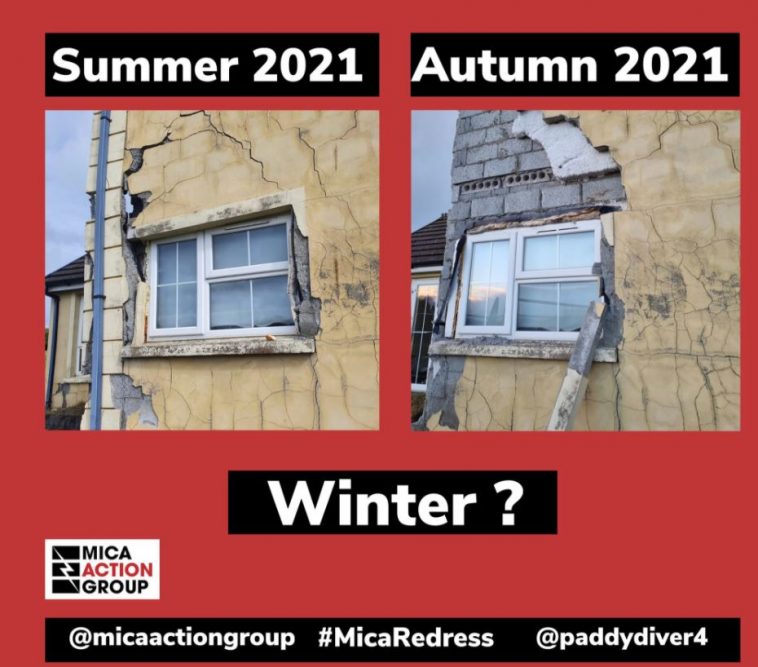The ROI government unveiled an updated mica redress scheme, as the defective blocks scandal throws a spotlight on insurance policies failing to cover costs and on the systemic lack of regulation of the Irish construction industry.
The new Defective Concrete Block Scheme is excepted to pay for the rebuilding or remediation of 6,000 to 7,000 properties which have suffered from structural damage due to blocks containing mica or pyrite, the Department of Housing, Local Government and Heritage announced today (30th November 2021).
The current maximum grant of 90 per cent has been upgraded to 100 per cent, but with price caps and set construction rebuilding costs.
The grant will now be based on the cost per square foot of rebuilding the existing home, fixed at €145 per sqft for the first 1,000 sqft with a sliding scale thereafter. Alternative accommodation and storage costs of up to €20,000 can be claimed for as well.
However, Independent TD Thomas Pringle said in the Dáil that for the average 2,300 sqft house in Donegal there will be a deficit of €45,000 still to be met by the homeowner. “This [means homeowners will still have to pay] almost 15 per cent of the costs.”
There is a maximum grant amount of €420,000 for demolition and rebuilding, up from the previous maximum of €247,500 which was announced in May 2019 as part of the first mica redress scheme for which the government had earmarked €20 million.
[adrotate banner="56"]Homeowners affected by defective concrete blocks took to the streets when the first redress scheme was announced and demanded a 100 per cent redress.
The government has now earmarked €2.2 billion for the updated redress scheme, to be paid partly by a levy on the construction industry which will be developed next year and will be introduced in Finance Bill 2022 to apply from 2023.
The cost of fixing homes that are known to have been affected by mica could reach up to €3.2 billion, according to a draft report carried out by a working group on the defective concrete blocks grant scheme and as reported by RTÉ.
Homeowners will now have to reapply with an initial Building Condition Assessment “at minimal cost recoupable on entry to the Scheme”, read the Department of Housing’s press release.
“It’s important to note there are potentially more than 7,500 affected homes, including social homes, and in recognition of the mammoth task which local authorities face, the Housing Agency will, in time, act as agents for each local authority in assessment, testing and categorisation of applications received,” said Minister for Housing Darragh O’Brien in the statement.
New regulator
The government also announced it would be establishing a new Building Standards regulator “to prevent future problems”.
The press release also mentioned the introduction of a Building Industry register, mooted for years now, and tasking the NSAI with reviewing concrete block standards “to ensure the highest standards are complied with into the future”.
“Let me be very clear in saying this Government will also explore all options in pursuing potentially liable wrongdoers and I will continue to work with the Attorney General in this regard,” said Minister O’Brien in the press release.
Muscovite mica experience
A report in the Sunday Times highlights how a homeowner who completed his self-build in 2000 started noticing hairline cracks in his wall in 2007. Since then he has had to demolish his house as it was declared unsafe because the crumbling blocks contained muscovite mica.
The self-build had a structural guarantee for new homes but this self-builder explains his provider refused to pay out, saying the defective substance was in the block before the guarantee was taken on the house.
Homes with defective concrete blocks, starting with pyrite, were documented from 2013.
Homeowner analysis
“In 2021 Ireland stands on the cusp of the biggest building boom since the Celtic Tiger to boost housing, but construction still works on a self-regulatory basis, there is no independent body to enforce standards and if something goes wrong Irish law is stacked against the homeowner,” wrote Lisa Hone, another mica affected homeowner, in thejournal.ie
“The regulatory environment these homes were built under unnecessarily exposed its citizens to malpractice, and deficiencies in Irish law do not give homeowners a route to redress.”
“More attractive for Government was the less onerous and cheaper preference of the construction lobby who enjoy working to the sweet sounds of self-regulation,” she added.
“Given the nature of builds, a small number of operators acting negligently, whether with intent or not, can result in devastating safety and financial implications. The mica/pyrite crisis spiralled because there was no mechanic to halt the production of bad blocks, so for at least 13 years, defective blocks were churned out.”
“An independent inspection regime testing the blocks would have detected the mica/pyrite, production halted, and the situation seriously mitigated.”
€365m bill for other defects
Fire defects in apartment blocks will cost at least hundreds of millions to fix, says the Construction Defects Alliance, an informal alliance of homeowners and Owners’ Management Companies that suffer from building defects.
The Irish Times reports first submissions to the Government’s working group on defective homes indicate that the cost of remedying Priory Hall type building issues, which mostly have to do with inadequate fire safety measures, will be at least €365 million.
The Construction Defects Alliance, which represents almost 400 affected homeowners, suggests in its submission that this sum is the “tip of the iceberg” with almost 21,000 impacted units now identified.
Costs submitted by apartment owners show they are facing an average bill of €17,635 to remedy legacy issues.



